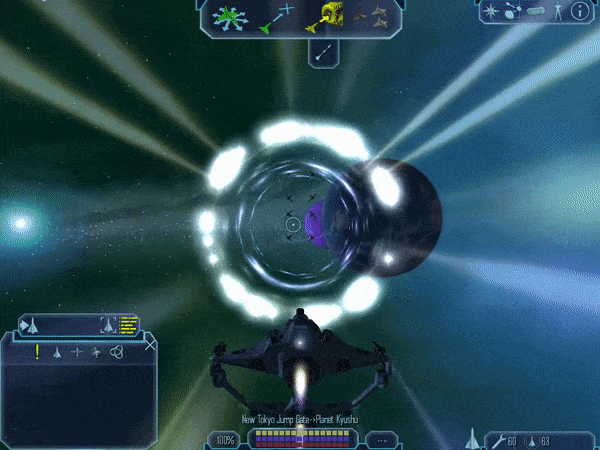There’s some kind of pull to games like Freelancer. Players are drawn to the promise of being a free agent, working in a space-based sci fi future, and developers keep making them. There is a long history of them going back to some of the earliest space simulators. Some are, of course, better than others. The original Elite was a sweeping masterpiece, Wing Commander: Privateer codified many of the elements of the genre, and Battlecruiser 3000AD established that, more often than not, the big claims and promises made in the lead up to release would lead only to crushing disappointment (see also No Man’s Sky).
Freelancer, build from a concept by legendary space sim designer Chris Roberts, actually differs quite markedly from many of these games. While most games in the genre use some form of procedural generation to populate their galaxies with stars, planets and space stations, Freelancer is more handcrafted. Each system you visit has lots of specific, interesting details for you to investigate, and a central part of the gameplay is spotting something interesting in the distance or on your map and going to check it out. There’s a real sense of this being a genuine space-based civilisation, not just a handful of outposts spread over some barren rocks. Importantly, the major planets of the game feel like unique places. Each of the major nations has a distinct vibe and aesthetic to their worlds, and great pleasure is taken in the sweeping camera angles that show off your ship arriving at planets, swooping around the skyscrapers and traffic.
One of the most striking features is the game’s depiction of infrastructure. The game’s “trade lanes”, essentially roads in space that let you travel at great speed, structure the way that you explore the galaxy. Following trade lanes means that you’re regularly encountering other ships as they haul cargo or patrol, and you get the sense that you’re part of a genuinely functional world as you listen to their radio chatter. When you tire of this and fly off on your own into the less inhabited parts of the systems, things feel rougher and more dangerous, but there’s genuine opportunities to discover exciting and useful things out there. When you encounter a system without any trade lanes you know you’re well off the beaten track, and that sense of discovery magnifies in proportion to how far from civilisation you feel.
The game’s story is somewhat throwaway; sweeping and epic but in a style that can’t help but feel generic. The voice cast is great, including John Rhys-Davies, Jennifer Hale, and George Takei, but really there’s only so far they can carry it. The game is technically a sequel to Chris Roberts’ post-Wing Commander flop, Starlancer, although it hardly matters. The opening cinematic, an absolute gem from the golden age of pre-rendered intros, immediately explains that Freelancer is separated from Starlancer’s space war by lightyears and centuries, and it would be entirely possible to play and enjoy the game without realising the connection.
It’s… odd, and ultimately hard to see why the connection was sought in the first place, especially when Freelancer is a game that very much does things its own way, with little regard to the legacy of space sim design. When it was released it copped flack for its rejection of some of the traditional design elements of the genre, most notably its lack of joystick support.
But, in throwing out many of the established conventions, Freelancer creates room to do things its own way. The mouse-driven flight model works better than just about any other example I can think of, and I’m reasonably sure that this is because it wasn’t built with the need to accommodate alternative schemes. By having you focus on the mouse as your principle tool for interacting with the game, it’s easy to have a complex, clickable interface. Tools for navigation, targeting, and cargo management can all be quickly accessed without pausing the game, so you can use any long stretches of travel fruitfully without being too vulnerable to surprise attack.
Where Freelancer ultimately ends up falling short is that it’s unsure what kind of game it wants to be. The elements feel like they belong to a sandbox type game. Systems are populated by dynamic ship traffic that feels like its there to be interacted with in a fashion similar to how one might play Sid Meier’s Pirates!, but the mechanics give you little incentive to do so. The single-player campaign in fact gives you very little opportunity to break from its linear progression, and by the time you’ve finished it there’s actually very little reason to engage with the sudden freedom you have thrust upon you. Systems like the trading and market mechanics sound good on paper, but but end up being somewhat hollow, especially as the commodity prices don’t fluctuate, meaning that being a successful trader is a matter of crunching the numbers to find the best profit margin and then making that run on repeat.
I’m given to understand that the multiplayer, a sort of short-term lite-MMO provides a better structure for playing with the systems, but I haven’t played it myself. This, of course, throws into sharp relief that Freelancer was conceptualised and intended to be more like Roberts’ current project, the long delayed Star Citizen. Much of what exists feels intended to be part of an ever changing online world, but that’s not the game Freelancer ended up being.








Very much one of my faves, and a highlight of my high school gaming career.